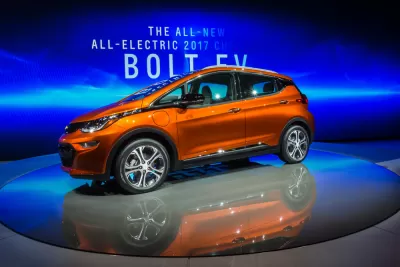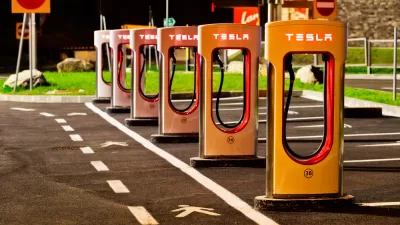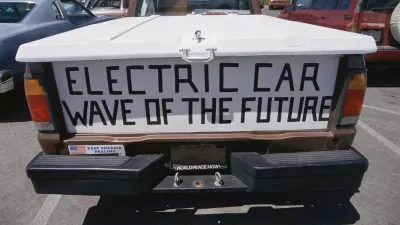David Yager, an oil industry consultant, writes that recent reports predicting electric vehicles will eventually outsell those with internal combustion engines are vastly exaggerated, notwithstanding national bans on future sales of such cars.

"Hardly a day goes by without another media report about the impending demise of the Internal Combustion Engine (ICE) as petroleum powered cars," writes David Yager for Business Insider.
He refutes claims that an increase in electric vehicle (EV) sales will lead to "the decline of petroleum production and consumption."
Your writer read dozens of articles and attended a conference on the future of EVs. The evidence overwhelming proves they pose no threat to oil prices anytime soon.
It is true that more nations now are agreeing to bans of oil-powered cars at some future date, most recently Great Britain and France setting the date at 2040; India at 2030; and Norway and The Netherlands at 2025. "Austria, China, Denmark, Germany, Ireland, Japan, the Netherlands, Portugal, Korea and Spain have set official targets for electric car sales," according to a July 26 report in CNN Money.
In response to the first two bans, Yager writes, "But however gloomy that may sound for the oil industry today, that is enough time for 6 elections in both countries which could change everything, the development of new technologies to make ICEs even cleaner and more efficient, and is sufficiently distant to be meaningless for all crude producers except the supermajors."
Yager also points to the dependence on perks to sell electric vehicles, and what happens when they are removed, illustrated by the 90 percent drop in EV registrations in the Atlanta region after Georgia ended the $5,000 rebate in 2015.
It will be interesting to see what effect the potential reduction, and then elimination of the $7,500 federal credit will have on sales of the popular, modestly priced Tesla Model 3 which began deliveries last week. "About 500,000 people have put down $1,000 deposits since last year to reserve delivery of Model 3s when they are available," reported Bill Vlasic for The New York Times on July 29.
"Model 3 buyers who receive their cars in the quarter when Tesla delivers its 200,000th U.S. vehicle will receive the full $7,500 federal tax credit," wrote Kyle of Teslarati.com on May 18. "The tax credit will drop by 50% two quarters after the 200,000th car is sold, and another 50% two quarters beyond that, before the tax credit is fully gone sometime around April 2019."
Yager is not alone in questioning the inevitability of the EV era.
"The real story being missed is just how pathetic things look right now for electric cars," opined the Financial Post's editorial writer, Kevin Libin, on July 11. "Gasoline prices in the U.S. turned historically cheap in 2015 and stayed cheap, icing demand for gasless cars."
Low gasoline prices are causing a drop in sales of fuel efficient cars as well as posing a threat to EV sales, resulting in an increase in greenhouse gas emissions. Take California, for example, which just released a glowing news release on its new greenhouse gas inventory. However, the real credit goes reductions in electricity generation. Emissions from passenger vehicles have been increasing since 2013 [pdf].
Nawar Alsaadi, an energy consultant who writes for Oil Price.com as does Yager, wrote in March about the "EV myth" in terms of their effect on oil demand. His conclusion:
In a nutshell. EVs are a red herring. By far the most important variable on passenger cars oil demand is changes in fuel efficiency standards. In this area, the United States is a clear laggard.
Should the Trump administration relax fuel efficiency standards, it would not be good for EV sales.
FULL STORY: Electric cars won't bring down oil prices anytime soon

Alabama: Trump Terminates Settlements for Black Communities Harmed By Raw Sewage
Trump deemed the landmark civil rights agreement “illegal DEI and environmental justice policy.”

Study: Maui’s Plan to Convert Vacation Rentals to Long-Term Housing Could Cause Nearly $1 Billion Economic Loss
The plan would reduce visitor accommodation by 25% resulting in 1,900 jobs lost.

Planetizen Federal Action Tracker
A weekly monitor of how Trump’s orders and actions are impacting planners and planning in America.

Wind Energy on the Rise Despite Federal Policy Reversal
The Trump administration is revoking federal support for renewable energy, but demand for new projects continues unabated.

Passengers Flock to Caltrain After Electrification
The new electric trains are running faster and more reliably, leading to strong ridership growth on the Bay Area rail system.

Texas Churches Rally Behind ‘Yes in God’s Back Yard’ Legislation
Religious leaders want the state to reduce zoning regulations to streamline leasing church-owned land to housing developers.
Urban Design for Planners 1: Software Tools
This six-course series explores essential urban design concepts using open source software and equips planners with the tools they need to participate fully in the urban design process.
Planning for Universal Design
Learn the tools for implementing Universal Design in planning regulations.
Caltrans
Smith Gee Studio
Institute for Housing and Urban Development Studies (IHS)
City of Grandview
Harvard GSD Executive Education
Toledo-Lucas County Plan Commissions
Salt Lake City
NYU Wagner Graduate School of Public Service





























